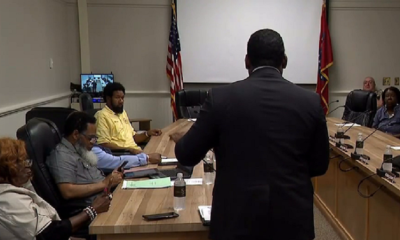Arkansas
Arkansas’s new firearms laws go into effect on July 31

Arkansas – Many of the laws approved during the legislative session will take effect at the end of the month, including ones that would affect gun owners.
The owner and concealed carry instructor of American Tiger Firearms in North Little Rock, Bryan Hearn, stated that while you currently need to pass his course to obtain a concealed carry permit, that may change in a few weeks.
“A lot of people say, well, now with the new laws going into effect, I don’t have to have a concealed carry,” Hearn explained. “Well, that’s true, that is your option. But I would recommend that you get some type of training, whether it be for concealed carry, or any, just a gun safety class.”
Act 777 demonstrates that Arkansans will not require a license to carry a concealed weapon starting in one month.
Even so, gun owners can still receive further training to carry in other states.
‘You can be more dangerous with a firearm if you don’t understand how it is just like putting somebody who’s underage in a car and put them out on the interstate. It’s very dangerous to them. And to us. It’s the same thing with a firearm, it’s a piece of machinery,” he said.
Hearn has been reading a stack of more than 100 pages this week, which also contains the following acts:
Act 757 would permit medical marijuana users to conceal-carry firearms as well.
“That means someone’s taking medicine. And if someone’s taking medicine, for the most part, that shouldn’t preclude someone from carrying a gun,” Law Professor Robert Steinbuch at the William H Bowen School of Law at the University of Arkansas at Little Rock explained the new law.
That violates federal law, according to Steinbuch, and will still need to be applied in real life.
“The challenge is that to buy a gun, you must declare that you’re not using illegal drugs and federally marijuana remains illegal,” Steinbuch said.
A person who voluntarily entered a mental health treatment center will be able to apply for a concealed carry license two years after their discharge under Act 30.
It is a complicated problem, according to Natasha Thorne, a mental health professional.
“You don’t want it to be a hindrance for somebody seeking treatment. If they say, okay, well, they’ll take my guns away, or, you know, I may not be able to protect myself,” Thorne explained. “However, if you have someone that may be actively suicidal, or in a mental health crisis, you know, one of the biggest concerns is just kind of limiting that access to those types of things.”
Hearn advised gun owners to always stay current, even when rules changed.
“If you’re going to carry a gun, you really need to know where you can care where you can’t… [legislators] make the laws, we just have to try to interpret them and teach them to what they’re saying,” Hearn added.
-

 Local News2 weeks ago
Local News2 weeks agoJefferson County is dysfunctional due to a dispute between the judge and justices
-

 Local News1 week ago
Local News1 week agoMay Fest 2024 promises a joyful street
-

 Local News2 weeks ago
Local News2 weeks agoSeveral recently painted murals in Little Rock’s downtown
-

 Local News2 weeks ago
Local News2 weeks agoA church in Fredonia becomes a museum with a mission of conserving African American history
-

 Local News2 weeks ago
Local News2 weeks agoThe 50th season of the Little Rock Farmers Market begins
-

 Local News1 week ago
Local News1 week agoLittle Rock School District considers filing a class action lawsuit against social media giants nationwide
-

 Local News2 weeks ago
Local News2 weeks agoThis is how artificial intelligence is used in the City of Little Rock
-

 Local News2 weeks ago
Local News2 weeks agoConway’s updated 911 system now has text and video features






Leave a Reply